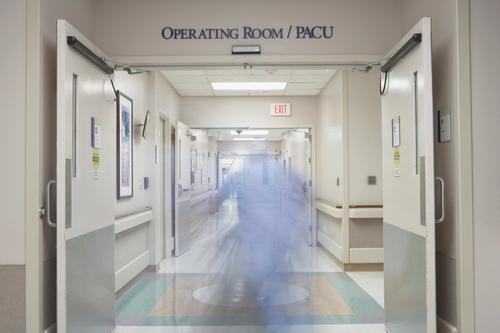Hospitals Grapple With Possibility of Ebola

Photo: ERproductions Ltd/Blend Images/Getty Images
By Tamara Lush
ST. PETERSBURG, Fla. (AP) — Step
inside All Children’s Hospital and you’re greeted with three things:
hand sanitizer, tissues and masks decorated with little cartoon
Band-Aids with legs, feet and smiles. “Dirt Squirt Alert!” a sign says.
“Stop the spread of germs that make you and others sick!”
A sign at the check-in counter
calls on people to immediately tell the triage nurse if anyone in the
family has a cough, fever and/or runny nose and has been to the Middle
East, part of a check for Middle East Respiratory Syndrome. Now they ask
another question to anyone with flu-like symptoms: Have you been to a
country with an Ebola outbreak?
As questions persist over the
handling of an Ebola patient who has since died at a Dallas hospital, it
has become clear that the key to containing the disease in the U.S.
lies with the response of local hospitals, like All Children’s. And the
problem of containing the outbreak extends far beyond using hand
sanitizer.
"The next patient with Ebola
will show up at a smaller community hospital somewhere," said Ashish
Jha, a professor of international health and the director of the Harvard
Global Health Institute. "We need a strategy now."
Nurses staged protests this week
around the country, saying that smaller hospitals aren’t prepared and
employees haven’t been trained to safely deal with Ebola cases. About 75
nurses participated in a union-organized rally Wednesday in Tampa.
Florida Gov. Rick Scott asked
the federal Centers for Disease Control and Prevention to explain what
Florida hospitals must do if they get an Ebola patient. Officials in
California said they are trying to determine whether to send Ebola
patients to specific hospitals.
Jha agreed that each state
should designate certain hospitals as “centers of excellence” available
to treat Ebola patients with Centers for Disease Control and Doctors
Without Borders protocols. But smaller facilities would still need to
brief staff on how to identify Ebola patients, and then designate a team
of caregivers who can treat them for about 24 hours until a CDC SWAT
team could get there for a transfer, he said.
At All Children’s, which treats
some 45,000 patients a year in its emergency room along Florida’s Gulf
Coast, some doctors and nurses have been assigned to a team to respond
to possible Ebola cases. They started receiving training with hazardous
materials suits and gear in the past couple of months, since the Ebola
outbreak emerged in Africa, said Dr. Juan Dumois, the director of
infectious disease at All Children’s.
But it’s a balancing act, Dumois said. It’s not like the hospital will put front-line check-in employees in hazmat suits.
To be sure, All Children’s ER
does differ from other emergency centers. It’s not as busy as a big-city
ER because it caters only to kids. And because the facility is only 5
years old, all rooms are private, which means each patient is
effectively quarantined in a room upon admittance to the ER.
Yet Ebola still poses problems
for its emergency room because some of its symptoms — fever, headache,
muscle pain, weakness — mirror a host of other common viruses, said
Dumois. As hospitals prepare for flu season, the difficulty could
increase.
"You can’t use initial symptoms to identify Ebola," he said.
Dumois said the first line of
defense for All Children’s is questions. Staffers in the emergency room
ask whether a patient has been to an Ebola-affected country, been in
contact with someone who had Ebola or treated patients with Ebola, he
said.
If the patient answers no to those questions, it’s easier for the staff to rule Ebola out, he said.
If the answer is yes to any of
the questions, hospital workers would immediately call the local and
state health department and the CDC, he said.
"You wouldn’t want them to leave
if you suspected Ebola," said Dumois. "They’ll likely get sicker and by
being in the hospital, we can treat them, and they will avoid infecting
others in the community."
That’s where things started to
break down in Dallas, when Thomas Eric Duncan first sought care at a
hospital ER late on Sept. 25 and was sent home the next morning. He was
rushed by ambulance back to the hospital on Sept. 28, where mention of
his recent arrival from Liberia finally roused Ebola suspicions, records
show. Duncan died last week. Two of his nurses have since contracted
Ebola, raising more questions about whether American hospitals and their
staffs are adequately prepared to contain the virus.
yahoo.